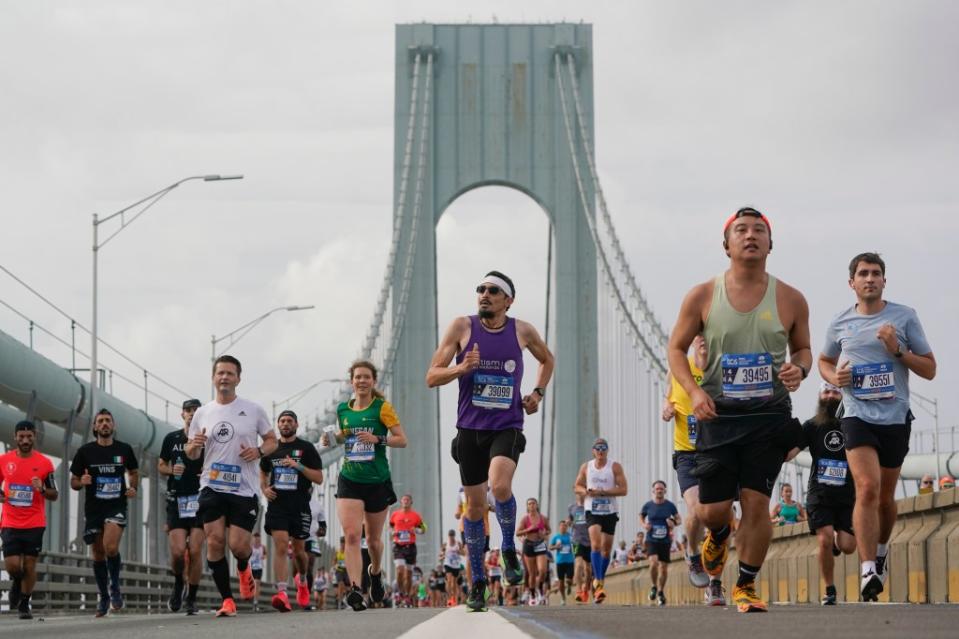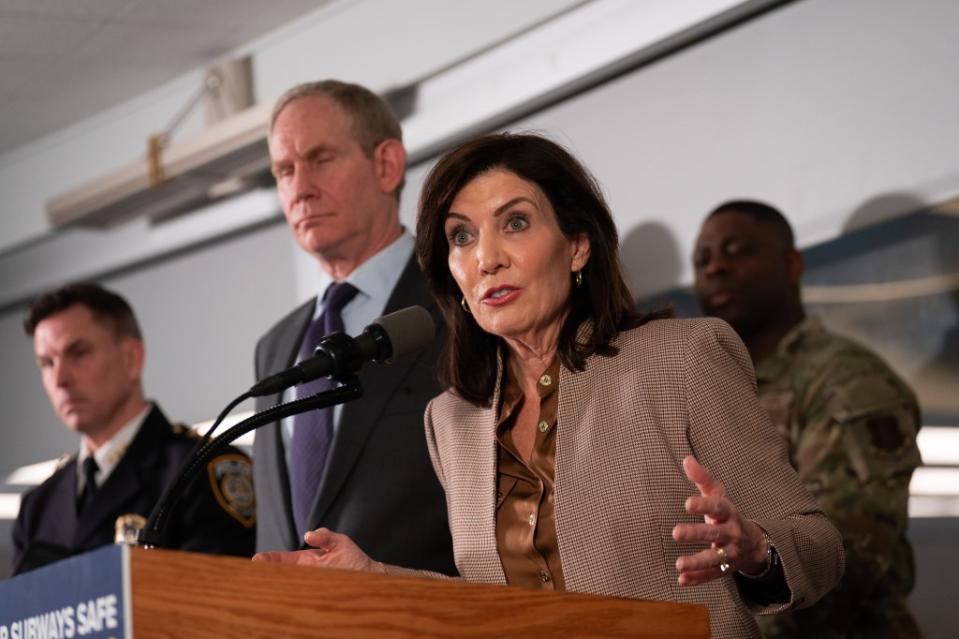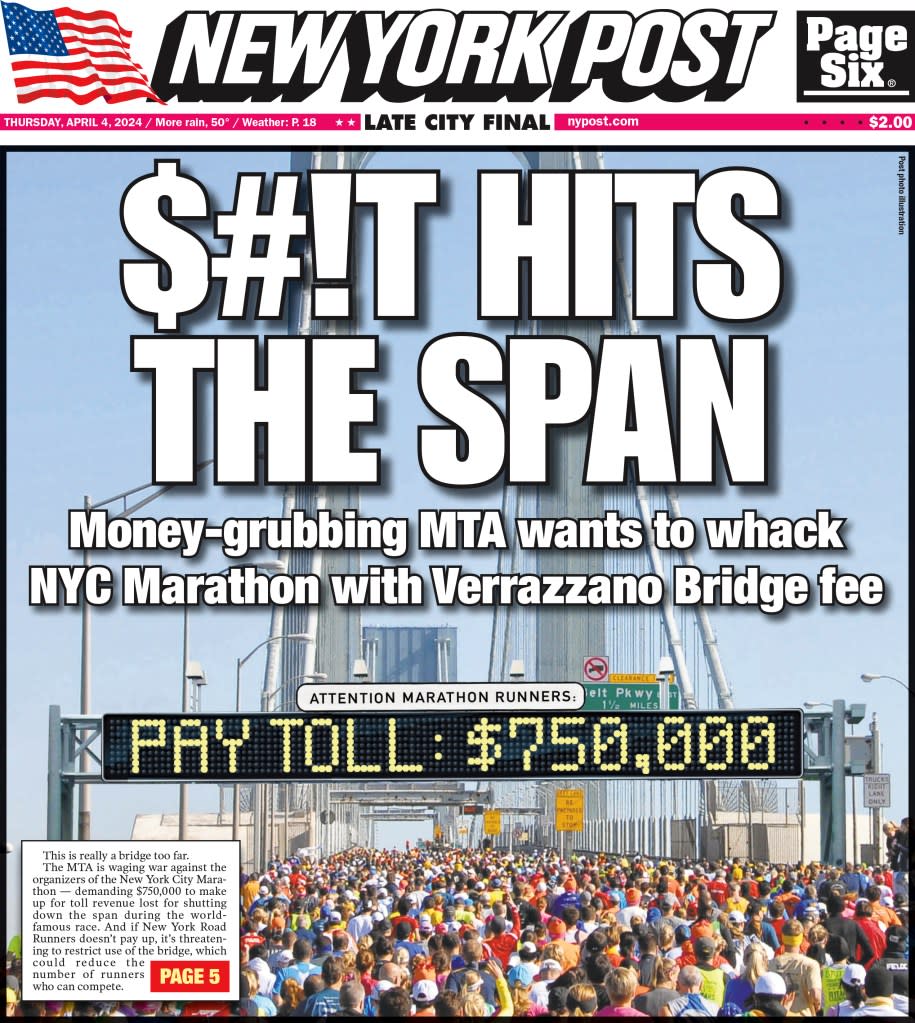NY Gov. Kathy Hochul orders MTA to stand down over NYC Marathon $750K toll fight after Post report on ‘cash grab’ move

- Oops!Something went wrong.Please try again later.
Stand down — and fix this mess!
Gov. Kathy Hochul on Thursday nixed the Metropolitan Transportation Authority’s efforts to squeeze a $750,000 toll from the organizers of the New York City Marathon — after The Post highlighted widespread outrage over the “cash grab” move.
“I’ve directed the MTA to fix this mess and allow the marathon to move forward as it always has,” Hochul said in a statement to The Post.
“The marathon is an iconic symbol of New York City’s tenacity and resilience that unites communities across the five boroughs each fall.”
Hochul’s decision to thwart the MTA’s latest scheme came a day after it was revealed the transit agency had been at war with marathon organizers for several months over shutting down the Verrazzano-Narrows Bridge during the world-famous race.
The governor’s office acknowledged The Post’s reporting in her decision to intervene in the New York City Marathon-MTA toll controversy..

“She acted in response to many concerned New Yorkers, including the New York Post,” a spokesman said.
The New York Road Runners said it was aware of Hochul’s statement, and the group appreciates “her support of the TCS New York City Marathon.”
During hardball negotiations, MTA officials had demanded the New York Road Runners fork over the hefty sum to cover the cost of toll revenue lost from shutting down the bridge at the start of the 26.2-mile race.
If the nonprofit didn’t pay up, the agency threatened to restrict use of the bridge to just one level — a move organizers insisted would reduce the number of runners who can compete in the major event, which generates hundreds of millions in cash for the Big Apple each year.
Despite the MTA painting the annual race as too costly, the marathon actually made an additional $1.1 million for the agency with record high ridership on race day last year, an analysis by The Post shows.
This more than made up for the $750,000 the MTA said it lost in toll revenue.
Critics were quick to lash out at the MTA’s mad dash for cash, especially given the system lost $690 million to fare and toll evasion in 2022, including $46 million in toll-dodging on bridges and tunnels alone.

Prior to Hochul’s orders to stand down, former Gov. George Pataki had taken a thinly veiled swipe at her as the outrage mounted.
“I would stop it if I were governor,” the Republican told The Post earlier Thursday, calling the MTA’s demands “another blow to New York.”
“It’s ridiculous. The marathon is an institution that puts New York at the center of the world,” he continued. “The marathon is such a beacon to the world. It’s something the whole world looks at while New York put its best foot forward. The idea that the MTA wants to profit off the race is ridiculous.”
As the negotiations unfolded, the MTA had initially said marathon runners would be restricted to the darker bottom level of the Verrazzano Bridge if New York Road Runners didn’t agree to the demands.

The agency later backtracked and told New York Road Runners it could choose either the bridge’s upper or lower deck, but not both.
The race, which attracts roughly 50,000 runners, has used both levels for the past 36 years.
In February, New York Road Runners wrote to Hochul begging for help — arguing it would have to limit the number of entries if use of the bridge was restricted.
CEO Rob Simmelkjaer stressed that the nonprofit — which reported a total income of $100.2 million last fiscal year — had already agreed to boost its payments to the MTA to cover the bridge’s closure to $200,000 for this year’s event.
“We have agreed to increase payments to the MTA in the form of both direct payments and the purchase of advertising on subways and buses. The MTA has made few concessions in these negotiations, however, and continues to insist on 100% reimbursement of lost toll revenue,” Simmelkjaer wrote.
Hochul, for her part, has ordered the MTA to revert to its original deal with New York Road Runners, which involves the group paying $150,000 to pay for security and staffing to close the bridge.
She has also encouraged the non-profit to continue finding other ways to generate revenue – including buying up ads on buses and trains.
Some MTA advocates had previously argued it wouldn’t be too much to pass the cost on to marathon runners themselves.
“The $750k in question could be covered by adding $15 to a $315 entrance fee,” the Riders Alliance, a membership organization of subway and bus riders, posted on X — noting it would be a less than 5% increase.
A source close to Hochul told The Post that the governor was against raising the marathon entry fee to recoup lost MTA costs.
The MTA declined to comment on Hochul’s orders. The New York Road Runners didn’t immediately respond to The Post Thursday.
Additional reporting by Nolan Hicks

